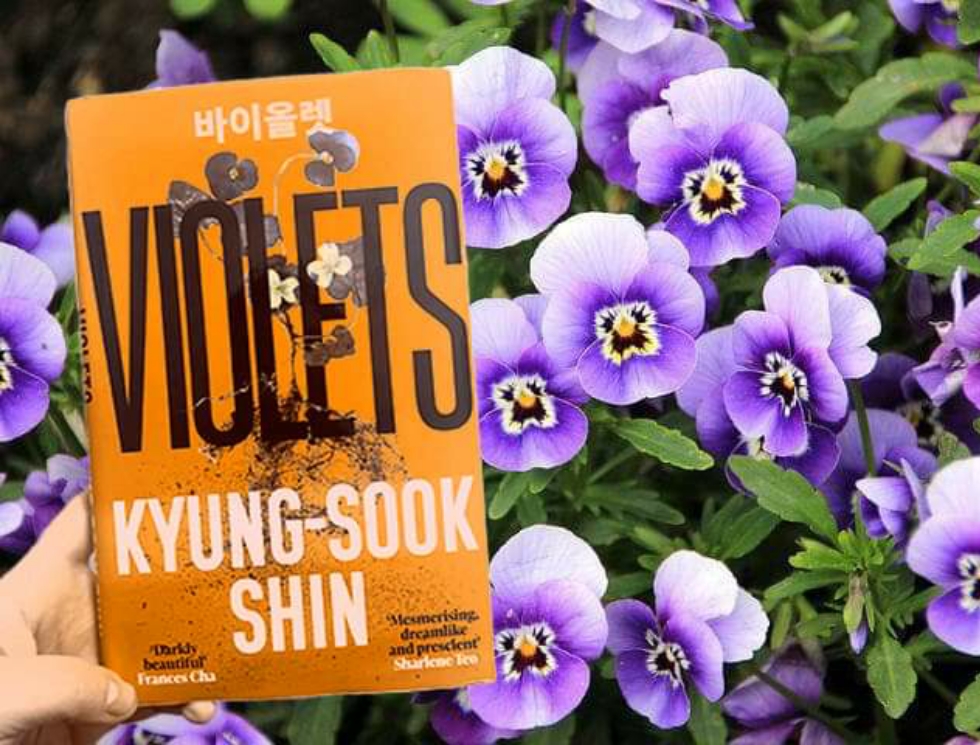Hidden Bookshelf 13: Violets Book Review – Gut Punch of Loneliness

Violets by Shin Kyung-sook is a literary fiction set in South Korea. Originally published in 2001, it’s recently been translated to English by Anton Hur and published by W&N in the UK and Feminist Press in the US last month. Before I start, I would like to thank Ellie Freedman and Federico Andornino from W&N for sending me a copy.
Violets tells the story of San, a lonely, unfortunate child in rural parts of South Korea in the 70s who grows up into an even lonelier woman in her early 20s, trying to make a life for herself in Seoul. San as a child had no one but her friend Namae. She wasn’t one of the rich kids, her dad was nowhere to be seen, and her grandmother and mother always fighting. She was ostracised by everyone but so was Namae. They embrace each other as the two unfortunate girls until one day they lay naked side by side by the river, while they wait for their clothes to dry. That day San thinks, ‘I will love you more than myself,’ while Namae ends their friendship in fear. From that day onwards, San’s life keeps getting lonelier.
I initially thought the book was going to focus on San’s sexuality, that it would be about her sexual discovery and the difficulty of being a queer woman in a conservative country like South Korea, from what I’ve heard about it and because this book was promoted as ‘lesbian literature’. Although in the greater sense, her loneliness and her reactions towards her loneliness seem to originate from her struggle with her sexuality and her experience with Namae, it appears to be more subtly handled and more overtly focusing on the concept of womanhood and loneliness.
‘San is not Yi San but Oh San.’ While every reader can see the meaning that Shin wasn’t part of the rich family, there is another reference here. Yi San was one of the greatest rulers of Korea’s Joseon Dynasty. While he did many great things for his country, he had a difficult childhood and a life of tragedy that followed him. When I saw this reference in the first few pages of the book, I feared for the rest of the book, as I was pretty sure this was a foreshadowing. Contradictory to the statement, they were similar in the sense of a difficult and lonely childhood that followed them to their childhood but she was right, San isn’t Yi San, she isn’t rich, she isn’t going to do great things in life, she isn’t going to take a place in history books and remembered for ages, but above all, she wasn’t a man.
I will be honest, plot-wise, I found that there wasn’t much happening which made it a slow read. However, there was A LOT happening between the lines. Violets is one of those books in which there is a greater meaning behind each word and image, which means you need to take your time and dwell on the meanings of words more than in some books.
The way Shin deals with the line between fragility, delicacy and violence is fascinating and poignant. San isn’t an easily relatable character, the reader is perfectly aware of the stupidity of some of her actions but that is part of the poignancy, she is a character that many people don’t understand. Knowing she would not be understood because even she can’t make sense of herself, she takes refuge in silence which makes her isolate herself with the fear of abandonment. This and the writer’s wish in the newly added afterword, that ‘she now finds understanding [our] hearts’ makes the reader want to understand her, yet, terrifies us to know the extent of actions loneliness can lead to. San is lonely but the idea of affection terrifies her. Her actions towards love are masochistic, full of fear and evasive. She is self-destructive as she is desperate for affection, yet more terrified of hoping her loneliness would end only to be back to being alone than remaining alone. She looks for attention in places she knows to be wrong. In men, in womanizers, in untruths her mind convinces her, in fantasies, in cruel arms of the past and avoidance.
The ending was shocking and to be honest with you, I still don’t know how I feel about it. The more I think about the book, the more my ideas about it change, and the more I discover about it. There are many layers to it and you discover something new in each layer from Ficus to Venus flytrap, from Violet to Violence. This isn’t a book for everyone but I do invite you to discover these layers and find your own understanding of ‘the little girl’.

Have a story to share? Contact us.
featherpen-blog@hotmail.com
Also, don't forget to follow us on Instagram!
@featherpenblog